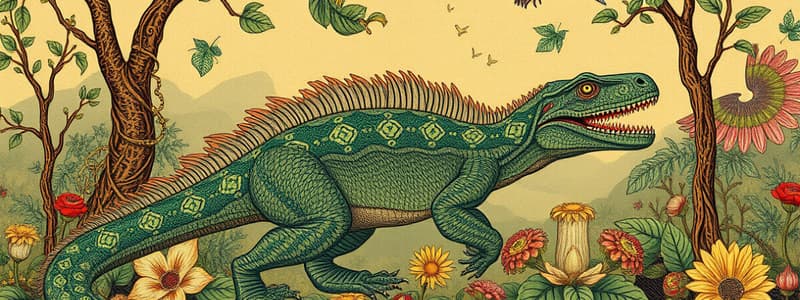Podcast
Questions and Answers
Describe the plant-life and atmosphere of the earth during this period.
Describe the plant-life and atmosphere of the earth during this period.
Much of the earth was covered in vast swamp forest with fifty meter distant relatives of ferns. Over one-third of the air was oxygen, making it an oxygen-rich atmosphere.
What physical changes have reptiles undergone compared to fish and amphibians that gives them a much greater range on land?
What physical changes have reptiles undergone compared to fish and amphibians that gives them a much greater range on land?
Tough scaly skin that traps moisture inside their body.
Incredibly large arthropods lived during this time. What modern arthropods do they resemble?
Incredibly large arthropods lived during this time. What modern arthropods do they resemble?
Mesothelae- spiders, Meganeurid- dragonflies, Arthropleura- millipedes.
Why were arthropods able to get so unusually large during the Carboniferous period?
Why were arthropods able to get so unusually large during the Carboniferous period?
What advantage did the Petrolacosaurus have that allowed it to survive the huge fire?
What advantage did the Petrolacosaurus have that allowed it to survive the huge fire?
Describe how the climate changed moving into the next time period. Which group of animals did this favor? Why?
Describe how the climate changed moving into the next time period. Which group of animals did this favor? Why?
What type of tree emerged and became dominant during this time period?
What type of tree emerged and became dominant during this time period?
What purpose did the sails of edaphosaurus and dimetrodon serve?
What purpose did the sails of edaphosaurus and dimetrodon serve?
What additional adaptations did dimetrodon have that made it such an effective predator?
What additional adaptations did dimetrodon have that made it such an effective predator?
What behaviors were present in dimetrodon that helped increase the survival rate of its offspring?
What behaviors were present in dimetrodon that helped increase the survival rate of its offspring?
How might the practice of cannibalism, even from the mother herself, actually help the evolution of the dimetrodon species?
How might the practice of cannibalism, even from the mother herself, actually help the evolution of the dimetrodon species?
Describe what changes reptiles underwent as the Permian period proceeded.
Describe what changes reptiles underwent as the Permian period proceeded.
Flashcards are hidden until you start studying
Study Notes
Plant-Life and Atmosphere
- Earth was dominated by vast swamp forests with fern relatives growing up to fifty meters.
- The atmosphere contained over one-third oxygen, creating an oxygen-rich environment.
Reptilian Adaptations
- Reptiles evolved tough, scaly skin that retains moisture, enhancing their ability to inhabit land.
Giant Arthropods
- Mesothelae resembled modern spiders.
- Meganeurid were analogous to modern dragonflies.
- Arthropleura compared to contemporary millipedes.
Arthropod Size
- High oxygen levels during the Carboniferous period facilitated unusually large sizes in arthropods.
Petrolacosaurus Survival
- Speed and stamina enabled Petrolacosaurus to escape fire, contributing to its survival.
Climate Transition and Impact on Animals
- Transitioning climate became drier with declining oxygen levels.
- Reptiles thrived due to their efficient hearts and waterproof skin, providing an evolutionary advantage.
Dominant Tree Species
- Primitive conifers emerged as the dominant tree species during this period.
Function of Sails in Reptiles
- Edaphosaurus and Dimetrodon featured large sails made of vertebrae and tissue for thermoregulation, allowing them to absorb heat from the sun.
Dimetrodon's Predatory Adaptations
- Dimetrodon possessed specialized teeth: incisors for shearing flesh and serrated canines for cutting.
Parental Care in Dimetrodon
- Exhibited basic parental care behaviors, such as guarding eggs and monitoring nest temperatures to increase offspring survival.
Cannibalism as an Evolutionary Advantage
- Cannibalism, including maternal consumption, helps eliminate weak individuals, enhancing the overall survival of the species.
Reptilian Evolution in the Permian Period
- Leg structure evolved for upright posture and increased speed.
- Strengthened backbones and muscles supported enhanced mobility.
- Skull bones expanded, allowing for a larger brain.
- Development of large, sharp teeth improved predatory efficiency.
Studying That Suits You
Use AI to generate personalized quizzes and flashcards to suit your learning preferences.




